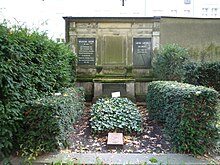Wilhelm Loewe
Friedrich Wilhelm Loewe (born November 14, 1814 in Olvenstedt ; † November 2, 1886 in Meran , South Tyrol ) was a German doctor and left-wing liberal politician . In 1848 Loewe became Vice President of the Frankfurt National Assembly and in 1849 President of the Rump Parliament .
Life
Wilhelm Loewe was born the son of a sexton and cantor in today's Magdeburg district of Olvenstedt. Loewe studied at the cathedral high school in Magdeburg . From 1834 he was licensed as a state-certified surgeon and served three years as a company surgeon . He then studied medicine in Halle , did his doctorate and, from 1840, settled in Calbe (Saale) as a general practitioner . Thanks to his liberal attitude and his exemplary social commitment, he had earned a high reputation in Calbe and in 1848 was delegated to the first German parliament, the Frankfurt National Assembly, as a member of the constituency of Calbe and Jerichow I. Loewe was one of the 33 MPs who offered Friedrich Wilhelm IV the imperial crown on April 3, 1849 . But that refused. After the advance of the princely reaction in 1849, most of the MPs returned to their homeland on the orders of their governments. Only the 114 democrats and left-wing liberals around the newly elected President of Parliament Wilhelm Loewe remained behind as a so-called rump parliament , which moved to Stuttgart .
After the defeat of the revolution, Loewe was charged and sentenced to life imprisonment. But he managed to escape via Switzerland to the USA, where he worked as a doctor and entrepreneur in New York City for eight years .
When the Prussian amnesty for political convicts came into force in 1861 , he returned to Calbe and became politically active again. He belonged first to the German Progressive Party and later to the National Liberal Party .
In 1863 Loewe became a member of the Prussian House of Representatives . In the dispute over the indemnity law between the national liberal and the democratic wing within the Progressive Party, Loewe tried to find a balance, but was unable to prevent the Progressive Party's split. In 1875 he served as the first vice-president of parliament. From 1871 he was a member of the Reichstag for the constituency of Bochum-Herne-Gelsenkirchen.
Loewe had a personal share in the development of the reform proposals for the unity of the German Reich and for a contemporary economic and liberal domestic policy. Loewe once used the words in the Prussian House of Representatives: "There is a sharp wind blowing on the Prussian major corner", which have become almost proverbial. He meant that the positions in the Prussian army from major upwards would be filled exclusively by nobles. As the senior president of the German Reichstag, he increasingly adopted Bismarck's positions of a revolution “from above”. In 1881 he withdrew from active politics.

Wilhelm Loewe died in November 1886 during a spa stay in South Tyrol at the age of almost 72 and was buried in the Matthäus-Kirchhof in Schöneberg near Berlin. In the hereditary funeral , his wife Luise nee Engell (1827–1902) her final resting place. The three-axis sandstone wall grave built by Heinrich Klutmann has been preserved but has been badly weathered. A dedication plaque "from his friends" on the middle plinth suggests that they financed the tomb. The grave has been dedicated as a Berlin honorary grave since 1952 .
Loewe was honored as a revolutionary democrat in his active city of Calbe in 1849 and in his honor "Querstraße", the most important shopping street in Calbe at the time, where he had also practiced as a doctor, was renamed after him. The city also awards a medal of honor with his name.
Individual evidence
- ^ Biography of Wilhelm Loewe (accessed October 24, 2019)
- ↑ Westfälische Zeitung. January 22, 1861.
- ^ Gerhard Eisfeld: The emergence of the liberal parties in Germany 1858-1870. Study of the organizations and programs of the liberals and democrats . Verlag für Literatur und Zeitgeschehen, Hanover 1969 (series of publications by the research institute of the Friedrich-Ebert-Stiftung. Series B: Historical-political writings), p. 183
- ↑ Hans-Jürgen Mende: Alter St. Matthäus-Kirchhof Berlin. A cemetery guide . 3rd, revised and expanded edition. Edition Luisenstadt, Berlin 2012, ISBN 978-3-936242-16-4 , pp. 22-23.
literature
- Heinrich Wiermann : The German liberals. Eugen Richter, Heinrich Rickert, Professor Hänel, Professor Virchow, Max von Forckenbeck, Freiherr Schenk von Stauffenberg, Ludwig Bamberger, Ludwig Löwe, Professor Mommsen (= The German Reichstag. Part 1). Renger, Leipzig 1884.
- Bernhard Mann (arrangement) with the collaboration of Martin Doerry , Cornelia Rauh , Thomas Kühne: Biographisches Handbuch für das Prussische Abrafenhaus 1867–1918 (= handbooks on the history of parliamentarism and political parties. Volume 3). Droste, Düsseldorf 1988, ISBN 3-7700-5146-7 , p. 251.
- Dieter Horst Steinmetz: Birth pangs of German democracy - Part 2: "The dearly won freedom must be preserved!" - The work of the democrat Wilhelm Loewe from the March Revolution to the September crisis in 1848. In: Sachsen-Anhalt-Journal. 2016, No. 3.
Web links
- Loewe-Calbe, Wilhelm in the database of members of the Reichstag
- Biography of Friedrich Wilhelm Loewe . In: Heinrich Best : database of the members of the Reichstag of the Empire 1867/71 to 1918 (Biorab - Kaiserreich)
| personal data | |
|---|---|
| SURNAME | Loewe, Wilhelm |
| ALTERNATIVE NAMES | Loewe, Friedrich Wilhelm (full name) |
| BRIEF DESCRIPTION | German doctor and politician (DFP, NLP), MdR |
| DATE OF BIRTH | November 14, 1814 |
| PLACE OF BIRTH | Olvenstedt |
| DATE OF DEATH | November 2, 1886 |
| Place of death | Meran , South Tyrol |
